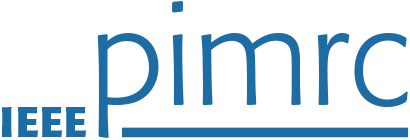Monday 12 September, 16:00-19:00(UTC +9)
Program
Workshop Keynote
Keynote
Yue Gao (University of Surrey, UK)
Monday 12 September, 16:45-17:45 (UTC+9)
Papers
| TIME(UTC+9) | Title | Authors |
| 16:00-16:36 |
Precoded Wake-Up Radio Signals in Multiple-Input Multiple-Output Cellular Networks | Ammar El Falou (King Abdullah University of Science and Technology (KAUST), Saudi Arabia); Nour Kouzayha (King Abdullah University of Science and Technology (KAUST), Saudi Arabia); Rawaa El Soufi (Lebanese University); Charlotte Langlais (IMT Atlantique Bretagne Pays de la Loire & Lab-STICC, France) |
| Throughput Assessment of Priority-based Semi-Grant-Free NOMA Protocol | Dimitrios Pliatsios (University of Western Macedonia, Greece); Alexandros-Apostolos A Boulogeorgos (University of Piraeus); Angelos Michalas (University of Western Macedonia, Greece); Ioannis Moscholios (University of Peloponnese, Greece); Panagiotis Sarigiannidis (University of Western Macedonia, Greece) | |
| 16:45-17:45 | Workshop Keynote | Yue Gao (University of Surrey, UK) |
| 18:00-18:54 | Intelligent Energy Efficient Resource Allocation for URLLC Services in IoV Networks | Rana Sohaib (University of Glasgow, UK); Oluwakayode Onireti (University of Glasgow, UK); Yusuf A. Sambo (University of Glasgow, UK); Rafiq Swash (AI Drivers, United Kingdom); Muhammad Ali Imran (University of Glasgow, UK) |
| QoS-Aware Sum Capacity Maximization for Mobile Internet of Things Devices Served by UAVs | Mohammadsaleh Nikooroo (Czech Technical University in Prague, Czech Republic); Zdenek Becvar (Czech Technical University in Prague, Czech Republic); Omid Esrafilian (EURECOM, France); David Gesbert (Eurecom Institute, France) | |
| LoRaWAN-5G Integrated Network with Collaborative RAN and Converged Core Network | Yu Chen (University of Glasgow, UK); Yusuf A. Sambo (University of Glasgow, UK); Oluwakayode Onireti (University of Glasgow, UK); Shuja Ansari (University of Glasgow, UK); Muhammad Ali Imran (University of Glasgow, UK) |
Scope
6G, the next generation communication system, is expected to satisfy unprecedented requirements on system performance in terms of throughput, latency, massive connections, and so on. In the 6G era, with the hyper-connectivity among humans and everything, we are anticipating Internet of Things (IoT) applications in various fields, including smart city, smart factory, smart home, smart grid, e-health, smart farming, and smart transportation, accompanied by new services with rich experiences, such as truly immersive VR/AR/MR (XR), etc. However, in order to facilitate these emerging IoT applications, we have to discuss the following issues. First, due to the heterogeneity of networking entities, various application requirements, and limited resources in IoT environments, greener and more advanced new hardware and software upgrades are required. Future IoT systems feature a larger number of devices and multi-access environments where different types of wireless spectrum, including Sub-6 GHz, Millimetre-wave, and Terahertz technologies, should be efficiently utilized. The increased in the number of IoT devices also increases the challenges in keeping a net zero carbon emission rate, hence creating difficulties to meet COP26 goals. To overcome these issues, a resource efficient IoT architecture should be designed to deal with the limited storage and computational capability of IoT devices. Other technologies, such intelligent reflecting surface (IRS), multiple-input-multiple-output (MIMO), etc., are needed to be altered to support the challenges faced by these resource constraint IoT devices. It is also crucial to determine the type and amount of data to be shared, stored, and processed among the different network entities with heterogeneous characteristics in an IoT environment. Moreover, the network environment and system requirements change with the space and time domains, which require intelligent approaches in perception, networking, and control. It is envisioned that the collaborative intelligence is the enabler for collaborative and greener IoT systems. To enable a greener and smarter society, more research efforts should be conducted on collaborative intelligence and to incorporate new hardware upgrades for IoT systems to expedite the applications of emerging IoT technologies. Therefore, this workshop aims at addressing the technical challenges for enabling collaborative intelligence and hardware upgrades for IoT systems, to support a greener and smarter society and to help IoT based companies to keep the 1.50 C goal of COP26 alive.
Only technical papers describing previously unpublished, original, state-of-the-art research, and not currently under review by a conference or a journal will be considered.
Topics of interest include, but are not limited to, the following:
- Agent theory and Green IoT applications in the 6G era
- Backscatter communications for Green IoT systems
- Energy harvesting, wireless information, and power transfer for Green IoT systems
- Wakeup radios and other low-power radio designs for Green IoT systems
- Intelligent reflecting surface design for IoT systems in the 6G era
- MIMO/massive MIMO upgrades for IoT systems in the 6G era
- Mm-Wave and THz enabled antenna designs for IoT systems in the 6G era
- Cognitive modelling of Green IoT systems in the 6G era
- Collaborative and distributed IoT systems and control
- Collaborative Green IoT frameworks in the 6G era
- Collaborative Green IoT technologies for 6G services
- Collaborative intelligence based on cross-domain big data for Green IoT
- Collaborative intelligence for Green IoT systems
- Collaborative intelligence security of IoT in the 6G era
- Computation-efficient collaborative intelligence approaches for IoT systems in the 6G era
- Data driven collaborative intelligence for Green IoT
- Energy-efficient collaborative intelligence approaches for IoT
- Group decision making for Green IoT systems
- Human-machine cooperation for Green IoT systems
- Intelligent collaborative processing for Green IoT
- Multi-agent systems for Green IoT in the 6G era
Organizing Committee
General Co-Chairs
Muhammad Ali Jamshed (University of Glasgow, UK)
Masood Ur-Rehman (University of Glasgow, UK)
Qammer H. Abbasi (University of Glasgow, UK)
Haris Pervaiz (Lancaster University, UK)
Muhammad Ali Imran (University of Glasgow, UK)
TPC Co-Chairs
Same as General Co-Chairs
Workshop TPC Co-Chairs
Same as General Co-Chairs
Important Dates
Paper Submission Deadline: 17 June, 2022 Extended to 30 June, 2022 –Closed
Acceptance Notification: 8 July, 2022 Extended to 22 July, 2022
Camera-Ready Due: 1 August, 2022 Extended to 8 August, 2022
Workshop Date: 12 September, 2022


